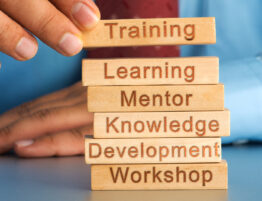As we near the end of August, you can’t help but notice all the ‘back to school’ signs and merchandise laid out at the front of the shops.
This got us thinking about how, nowadays, the idea of getting back into learning mode is no longer reserved just for children and young people. The principle of ‘lifelong learning’ has long been something that many adults have embraced but, as our world continues to change at such a fast pace, this seems to be becoming more important than ever.
The great thing about following a lifelong learning approach is that it doesn’t have to be formalised study like registering for a degree or taking an evening or online course. It can be any of those things if that’s your ambition, but it might equally be something less formal like learning a skill through a new hobby or taking in fresh knowledge by reading a book, listening to a podcast or joining an online forum about a subject that you’re interest in.
The even better thing is that lifelong learning offers multiple benefits, including:
Professional development
Whether you want to do well in your current role, gain a promotion or land a new job, taking the time to acquire and maintain the most up-to-date skills you need is the key to success. You might do this through learning by experience (e.g. asking a colleague to teach you new skills) or by registering for a course. Don’t forget that, with many employers asking about hobbies and interests in job interviews, leisure classes can also be directly beneficial for career and job advancement.
Keeping your brain healthy
Recent clearly shows that the process of acquiring new knowledge keeps our brain cells working at optimum levels. Maintaining this kind of brain workout over a lifetime can limit the cognitive and memory decline that comes with age and lead to a longer life in general.
Better mental health
Engaging in lifelong learning offers so many good things for our mental health. For a start, if you choose to learn something new, it’s probably because you enjoy it and, as you make progress with your new skill, there’s almost always going to be a rewarding sense of fulfilment and feelings of happiness. Improving our emotional balance is another benefit, something which can help us to avoid mental health problems like depression or anxiety.
Staying connected
Whilst reading a book may be a more solitary pursuit, many other forms of adult learning offer the bonus of allowing you to meet and connect with new people. As well as forming new friendships, this can also be a great way of connecting with other people’s ideas and exploring ways of thinking that you might otherwise not come across.
Contributing to your community
People involved in lifelong learning are apparently more likely to be involved with causes that relate to their local community and its improvement. For instance, they are about 20% more inclined to support vital community organisations such as recreation facilities, parks, public schools and higher education. That might be because their knowledge/ skills improvement has led to a wage increase or because they’ve just expanded their mindset to think more widely about issues that are for the good of society as a whole.
What about construction?
In construction, all of the above-mentioned benefits of lifelong learning apply.
Masters of trade have to continuously upgrade their work-related skills in order to stay ahead of technical advances and maintain their safety. And, nurturing a healthy brain, good mental health, connectivity and sense of community is always going to help people working in construction to succeed, feel fulfilled, be open to new ideas and become socially responsible citizens.
So, make today the day you start your lifelong learning habit:
- Take up every offer of on the job/ informal training.
- Register for formal opportunities at local colleges or online (e.g. via Coursera, LinkedIn or the Open University).
- Start that new hobby you’ve been thinking about.
- Pick up a book or read up on the latest trends in your industry through articles/ blogs.
- Follow a podcast.
- Ask colleagues to share their knowledge with you.
- Do anything that adds value to your personal knowledge/skills bank!
At Sheriff Construction, we try to provide all our team with options that help them learn and grow. If you’re working with us and have ideas about lifelong learning that you feel would help you or your team, talk to your Manager or email the office directly on info@sheriffconstruction.co.uk.
24.08.2021
Feature image: Rawpixel/Shutterstock.com








